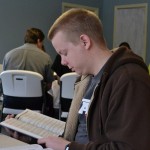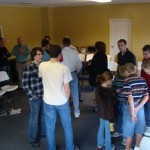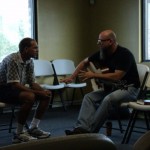How does our church meet together (Part 2)
Last week, I wrote “How does our church meet together (Part 1).” In that post, I described what happened when our church gathered together on Sunday, April 3, 2011. I also said that our next weekly meeting (April 10, 2011 – 2 days ago), would be somewhat different.
In this post, I’m going to describe how we met together last Sunday. We’ve met like this several times during the last year, and most people seem to enjoy it tremendously.
Again, people begin arriving just before 10:30 a.m. This time, instead of setting up our chairs in two concentric circles, we set up several tables with chairs around each table. Again, people brought food with them as they arrived.
Around 10:30, we all found seats around the table and began singing a few songs. This time, instead of someone choosing songs for us to sing, each person was given an opportunity to suggest a song for us to sing. The person would also explain why he/she wanted to sing that particular song.
After singing a couple of songs, we read through the book of Colossians again. We’ve been reading through and studying the book of Colossians together for several weeks, and this was to be our last week of studying Colossians. Different people read different parts of the book.
Then, we sang another couple of songs, and I led us through a review of what we had studied so far. This review was extremely interactive. Afterward, one our younger brothers – a 13 year old – had prepared a teaching on Colossians 4:7-18, so he led us in studying that passage as part of our ongoing study. As he stepped through the passage, other people also taught/shared from their own studies.
Next, we broke a loaf of bread and passed it around to begin our meal together. As we ate the bread together, several people “remembered” Jesus by sharing about the significance of his broken body. Then we continued the meal by eating lunch together around the tables. As we ate, each table discussed amongst themselves the significance of what we had learned from the letter to the Colossians.
After we had eaten, a few people from each table shared what they had talked about with the whole group. Then we continued encouraging one another as a group. Eventually, again, this resulted in people asking for prayer, and someone praying for them.
After praying for a while, we passed around the juice (no, we don’t use wine). As we filled our cups, different people “remembered” Jesus and the significance of the cup of the new covenant. By this time, it was about 1:30 p.m., and we had been meeting together for about 3 hours.
Even after drinking from the cup together, many people hung out for a long time. Some of us then went to a local park to play volleyball together.
While the “format” of this meeting was different from the one before, the purpose was the same. We met together to help one another grow in maturity in Jesus Christ.
How does our church meet together? (Part 1)
Occasionally, I like to share examples of how we meet together as a church. Why? Because that’s the number one question that I’m asked by people who meet me and find out that our church is a hybrid – somewhere between an organic church and an institutional church. While most of our life together is organic and relational, many aspects of our weekly meeting (not other meetings) are carryovers from our more traditional beginnings.
By the way, this is “Part 1” because next Sunday we will be meeting together in a completely different way. I’ll tell you about that meeting next week in “Part 2.”
We have decided to rent a small store front to meet in on Sundays and for other uses throughout the week, and we have decided to start meeting at 10:30 a.m. on Sundays (except when we go to the beach or park or somewhere else together). So, a little before 10:30 people start arriving. As they arrive, some start setting up chairs, while others chat with one another or pass out hymnals, song sheets, etc. This Sunday, we set the chairs out in two concentric circles.
As people arrive, most of them bring food, because they know that we are planning to eat together. How do they know? Because we do this every week. Sometimes we plan bigger meals (like we did last Sunday), or sometimes people just bring sandwiches, soups, or whatever. Most people bring enough to share so that we can invite others to join us even if they didn’t bring food.
Around 10:30 – the exact time is not as important to us – everyone begins finding a seat, and someone “kicks off” our meeting. Since I was planning to facilitate our teaching last Sunday, I started our meeting off by asking people if they had anything they wanted to share from Colossians. We have been studying Colossians for a few weeks, and several people made very good and challenging observations.
One of our brothers who plays guitar led us in a few songs. There were a couple of hymns and a couple of newer songs. In the middle of singing, we stopped to read through Colossians. We read the entire book, with different people taking turns reading different sections of the book. After reading Colossians, we sang a couple more songs.
We had scheduled to study Colossians 3:5-4:6. So, I started the teaching time by doing a brief review of the first part of Colossians that we had already discussed in previous weeks. Then, another brother taught for a few minutes on the first part of our passage for the week. I continued the teaching, asking for and receiving input from the church. We took the passage paragraph by paragraph, and often returned to previous sections of the book or other parts of Scripture to help us all understand something. (By the way, I was not the only one referring to other parts of Colossians or Scripture.)
Once I had completed what I wanted to teach, the church continued discussing the passage. Many times, people would talk about specific applications to their own lives, or they would make a connection to something that had already been said.
As is usually the case, the discussion of Scripture resulted in people asking the church to pray for them about certain things. We would stop then and pray. We spent alot of time asking for prayer and praying for people.
By this time, it was about 12:30, so we started moving the chairs around and setting up tables. We have several round tables and a few rectangular ones. Once the tables were set up, we broke a loaf of bread and shared the cup (actually several cups). We talked about how Jesus Christ died on the cross for the forgiveness of sins and to invite us into the new covenant with God.
Once we shared the bread and the cup, we continued meeting around the tables while we ate lunch together. This time of food and fellowship and encouragement lasted until about 2:30 or so when people started cleaning up, clearing the room, and heading home.
(By the way, that wasn’t the end of our time together for most of us. Many people continued to spend time with one another during the day. For example, my daughter and I joined other families and friends at a local park for a game of kickball.)
If you have any questions or comments about our meeting, I’ll be more than happy to answer or respond. We’re always open to learning and growing and trying new ways to meet together. Like I said, next Sunday we will meet together in a completely different way. You can read about that meeting next week.
Which one was church?
Last Friday evening, some friends invited us to their house. Another family joined our two families. We had dessert (cookies, brownies, cheesecake) and talked about our week and what had been going on in our lives.
Saturday evening, we invited some new friends and an old friend who was in town for the day to dinner. We went to one of our family’s favorite restaurants, which happens to be a Thai restaurant. Again, we talked about life in general. Since the new friends had recently moved into town, we talked with them alot about their move and getting adjusted to their new situation.
On Sunday morning, our family joined several other families in a place we rent specifically for meeting together. We sang some songs. We discussed Scripture. We prayed for one another. We ate lunch together. (Our family had meatball subs provided by another family.) We talked about life and the struggles that we’ve been going through.
Which of those meetings was church?
None of them. The church is not a meeting. But, in each case, believers were gathered together, so the church of Jesus Christ was present.
Did we act like the church should act in each case? That’s a different question. We were the church, and so we should seek to build each other up whenever we meet together. This is true for an impromptu gathering of friends in a house or restaurant (or park or beach or anywhere else). It is also true for a planned gathering.
In each case, we were able to get to know one another better and help one another with our walk with Christ.
A different kind of building
Three years ago, I wrote a post called “A different kind of building.” This post investigates some of the metaphors that Paul uses for the church in Ephesians. Primarily, I look at the combination of building and planting. The church (the people) are the house of God, but we are a different kind of building.
———————————————————-
When someone builds a building, when it is complete, at that moment it is the most resplendent that it will ever be, barring future improvement. From the moment that the building ceases, the edifice begins to deteriorate. Thus, when the building stops, the unbuilding begins. This is the nature of our fallen world.
When construction was completed on Solomon’s Temple and when the temple was dedicated, the temple was as beautiful and as perfect as it would ever be. The wood was now rotting. The stone began to crack and chip. The gold would flake off. In other words, the building would begin to unbuild itself. As you read the biblical account, you will see that there were many instances where people repaired the temple because it was falling apart.
There is a different kind of building – a building that does not unbuild – a building that does not fall apart as soon as construction is complete. In fact, this building continues to become more and more complete. It does not deteriorate. Instead, its beauty is continuously growing. What building? You and me and the entire building of God – the church.
This is what Paul wrote in Ephesians:
So then you are no longer strangers and aliens, but you are fellow citizens with the saints and members of the household of God, built on the foundation of the apostles and prophets, Christ Jesus himself being the cornerstone, in whom the whole structure, being joined together, grows into a holy temple in the Lord. In him you also are being built together into a dwelling place for God by the Spirit. (Ephesians 2:19-22 ESV)
Unlike other buildings, the household of God – the building of God – the temple of God is not build on dead stone or earth. It is built on a living, breathing Lord. The whole edifice being built, is joined together, and is growing because of Jesus Christ and him alone. Notice the emphatic phrase “Christ Jesus himself”, and then the two relative clauses”in whom” and “in him”. Since the Cornerstore is alive, the building is alive. Since the building is connected to Christ, the building continues to be built, continues to be joined together, and continues to grow. This building does not deteriorate; it grows more and more resplendent.
Unlike other buildings, this building is not made of dead material. Instead, this building – this dwelling place of God – is being built of living stones (as Peter puts it) – stones which have been given life by their Lord, who is also their architect, their builder, and their cornerstone. Paul combines the metaphors of building and gardening specifically because this is a different kind of building – a growing building – a living building. He combines these metaphors again in chapter 4:
[W]e are to grow up in every way into him who is the head, into Christ, from whom the whole body, joined and held together by every joint with which it is equipped, when each part is working properly, makes the body grow so that it builds itself up in love. (Ephesians 4:15-16 ESV)
He also combines these metaphors of construction and gardening in 1 Corinthians:
I planted, Apollos watered, but God gave the growth. So neither he who plants nor he who waters is anything, but only God who gives the growth. He who plants and he who waters are one, and each will receive his wages according to his labor. For we are God’s fellow workers. You are God’s field, God’s building. According to the grace of God given to me, like a skilled master builder I laid a foundation, and someone else is building upon it. Let each one take care how he builds upon it. For no one can lay a foundation other than that which is laid, which is Jesus Christ. (1 Corinthians 3:6-11 ESV)
We are both God’s building and God’s field (or garden) because together we make up a living building – a building which is alive with the life of Christ and grows through the power and working of the Spirit. This is truly a different kind of building.
Commenting on this building, Peter O’Brien said the following in The Letter to the Ephesians (Grand Rapids: Eerdmans, 1999):
There is a mixture of building and organic images in the statement that the whole structure is ‘being joined together’ and is ‘growing’ into a holy temple in the Lord. The cornerstone unites the building ‘because it is organically as well as structurally bound to it’. So to speak of the building being joined together refers not simply to the union of one stone with another, but also to the union of the whole structure with (and in) the cornerstone. Both verbs, which occur again in 4:15, 16, focus on the idea of continuous progress. There, in a similar mixing of metaphors, the body is ‘joined together’ and ‘built up’ from Christ the head. (pg. 219 – emphasis in original)
The building exists because of Christ, who is both the head and the cornerstone. The building is joined together because of Christ. And the building grows because of Christ. Just as he has given life to dead people (Ephesians 2:1-10), he has also given life to a dead building.
O’Brien said that the two verbs “joined together” and “built up” focus on continuous progress. Thus, this building – which is built, joined together, and growing – is continuously progressing and continuously growing and continuously becoming more beautiful toward some final outcome. What is the goal of this progress?
…until we all attain to the unity of the faith and of the knowledge of the Son of God, to mature manhood, to the measure of the stature of the fullness of Christ… (Ephesians 4:13 ESV)
The final outcome of this building progression will be complete unity – both with one another and with God – and complete maturity – measured against Christ himself. We are progressing, but we are not there yet. How beautiful this building will be when we reach unity and maturity! Of course, there is still much disunity and immaturity today. But, how amazing it is to be part of this dwelling place of God – a growing, changing, moving, working temple – which is an altogether different kind of building.
The Didache: Gather together frequently
I have been progressing slowly (very slowly) on my dissertation. (In case you forgot, my dissertation is titled “Mutual Edification as the Purpose of the Assembled Church in the New Testament: A Study in Biblical Theology.”) Currently, I’m studying what various Christians wrote about the assembled church in different time periods of church history.
Lately, I’ve been studying the Didache. The first part of the Didache (chapters 1-6) deals with the “two ways”: the way of life and the way of death. Many of the exhortations echo what we read in Scripture.
The last part deals with various practical (as if the way of life is not practical) aspects of living together as the church. The author discusses baptism, fasting, the Lord’s Supper / Eucharist (which those eating leave “filled”), various traveling servants (apostles, prophets, teachers), local servants, and choosing elders and deacons.
The conclusion of this book begins with an exhortation to “be on the alert”! What does he want them alert about? Well, several things, but gathering together is one of those things. Here is that passage:
Now, gather together frequently seeking those things which are fitting for your lives. For the whole time of your faith will not benefit you if you are not made mature by the last time. (Didache 16:2 author’s translation)
The author of the Didache tells his readers to gather together for one purpose: to seek those things which are fitting (proper) for your lives (souls). (Interestingly, worship is not mentioned in this passage.) What are the things that are fitting for their lives?
He says that the entire time of their faith (the entire time of living by faith?) will only benefit them if they mature by the end of their lives. Thus, he wants them to mature; he expects them to mature. In fact, the language is quite shocking. If they do not mature (in the context of their meeting together), then their entire time of faith will be of no benefit.
This sounds very similar to Hebrews 10:24-25:
And let us consider how to stir up one another to love and good works, not neglecting to meet together, as is the habit of some, but encouraging one another, and all the more as you see the Day drawing near. (Hebrews 10:24-25 ESV)
The Epistle of Barnabas (another early Christian writing) also has a similar passage:
For this reason, we should be attentive in these last days; for the whole past time of your life and faith will be of no benefit to us, unless now in this wicked time we should stand against coming temptation, as is suitable for children of God. Therefore, in order that the Black One may find no means of entrance, we should flee from every futility (frustration?), and we should completely hate the works of the way of evil. Do not live separate lives, by each going his own way, as those who have already been justified; but by coming together in harmony, you must discuss what leads to the benefit of all. (Barnabas 4:9b-10)
In the Didache passage, notice the words the author uses to describe the expected gathering: “frequently” and “fitting for your lives.” Also, notice the verbs used to describe the gathering: “benefit” and “made mature.”
Similar phrases are found in the Hebrews passage: “not neglecting,” “love and good works,” and “encouraging.” And, similarly, we find these in the passage from the Epistle of Barnabas: “benefit,” “stand against temptation,” “suitable,” and “harmony.”
While there are some differences in this descriptive terms (some positive, some negative, for instance), they are very similar. And, the instructions were given to all the readers, not just the leaders. (That’s true of Hebrews, the Didache, and Barnabas – all written to and addressed to all believers, not just to overseers, elders, deacons, teachers, prophets, apostles, etc.)
Should we still expect these same types of phrases to describe our gatherings? Is it still the responsibility of all the believers, or just the leaders?
Encourage one another daily
On this blog, I write alot about the church. I mean, the title of the blog is “The Assembling of the Church,” so what else should you expect.
But, sometimes, we can all fall into the trap of thinking of the assembling of the church as a once per week thing (or even twice or three times).
However, when we read Scripture, we see a different picture. Consider just this one snippet of Scripture from the Book of Hebrews:
But exhort one another every day, as long as it is called “today,” that none of you may be hardened by the deceitfulness of sin. (Hebrews 3:13 ESV)
In that passage, the author tells his readers to help one another so that they (individually or together) do not become hardened to sin. But, to the point of this post, he tells them to do this daily. Not weekly; but daily.
When reading through Scripture, it doesn’t take long to see a pattern: we need each other in our lives daily. Getting together once per week – even in a highly participatory meeting – will not give us opportunities to love, teach, care, share, admonish, encourage, etc. one another as we need for our spiritual growth.
No. The interaction must be more often and more personal than we see in most church meetings. We need others to ask us the hard questions about our own lives, and we need to ask others hard questions about their lives.
Of course, this all assumes that we are willing to share our lives with one another, and that we are willing to make the extra effort (and give up much personal or family time and energy and resources). To be honest, many are not willing. Many are not willing to open their lives to other people, and they are not willing to step into other people’s lives that are opened to them.
But, we need this. It’s not just a good idea; it is the way that God has chosen to work in and through us. Paul wrote that we grow when our lives are knit together and function together like muscles and ligaments. And what happens if we are not knit together in this fashion? We don’t grow.
If you look around the landscape of the church today, you’ll see many, many, many immature Christians. We are not growing.
So, how are you planning to encourage others today? What? Planning? Yes, planning. We must be intentional.
How are you planning to encourage others today? What about tomorrow?
How have others encouraged you day to day?
(Please share… these are not rhetorical questions.)
Messy Meetings
Four years ago, I wrote a post called “Messy Meetings.” Of all of my posts, this is one of my favorites. I hope you enjoy it.
————————————————————-
Relationships can be messy. We all know this. We have experienced “messy” relationships, and Scripture tells us that relating to people will not be easy. If relationships were easy and maintenance free, then we would not need “Spirit power” in order to love people. If relationships were not messy, then we would not need “Spirit power” in order to bear with one another with patience. In fact, one of the amazing things about our new life in Christ is that we can now – finally – relate to people who we would not naturally be able to relate to. We can now relate to them supernaturally, because we can now relate to God.
Of course, we do not always live in the supernatural. We do not always walk in a worthy manner. We do not always follow the Spirit. We have seen what happens in our lives and in the lives of others when this happens. Things get messy. But, we all know – or at least, we all SHOULD know – that we do not turn our backs on people when their lives get messy.
But, what about during times when the church gathers together? I believe that Scripture teaches that all believers should have the opportunity to interact with one another when the church gathers. This interaction should always be led by the Spirit, motivated by love, and for the purpose of edifying (building up to maturity) other followers of Jesus Christ. I believe God works through the gifts of all in order to grow the entire body of Christ into maturity in Christ Jesus, and I believe that this should happen anytime the church gathers.
But, what happens when one of those “participants” speaks when not led by the Spirit? What happens when someone is not motivated by love, but contributes anyway? What happens when someone acts, but their purpose is not to build up the body? What happens when someone is hurting, and they let the church know about their hurt? What happens when someone is afraid, and they voice their fear? What happens when someone disagrees?
In other words, what happens when things get messy during the meeting of the church?
There are several options in this scenario. The first option – and the one usually taken throughout most of church history, whether people realize it or not – is to limit the amount of participation during the meeting of the church. If only certain people are allowed to speak or sing or pray or contribute, then there is less chance for things to get messy. This is usually done in the name of “order”. However, I think there is an inherent problem with this solution. For one thing, this solution suggests – even inaudibly – that only certain people are qualified to contribute and only certain people are necessary for the proper functioning of the church. Also, this solution suggests – even inaudibly – that the event of the meeting is more important than the people who are meeting. This option also suggests that “messy” relationships between people are equivalent to disorder, and are thus not proper for times when the church gathers.
Another option is to allow the mess to occur, then trust the Spirit of God to use the people of God to lovingly care for the “messy” people – which, can be me or you at times, if we are honest. Thus, even when the church meets, there is a need for “Spirit empowered” love and “Spirit empowered” patience.
What are the implications of this option? Well, first of all, we have to admit that we do not know what will happen when the church gathers together. Things may not go “as planned”. Thus, we have to admit to ourselves and to others that our plan – if we have one – is not the most important thing. Instead, the people become more important than the event. We also must – truly – trust the Holy Spirit to work in and through his people, even during the meeting of the church. We must admit that we do not have all the answer, and that God may not choose to work through us during this meeting (regardless of our title, position, role, function, gifting, etc.). God may choose to work through someone else. He may even choose to work through someone’s mess – if we allow him to.
This is very difficult to do – it is even difficult to think. Even after thinking through this idea of “church” for several years, I still have this habitual understanding that I should be quiet (thus, reverent) when I come together with the church (unless, of course, I have been scheduled to speak). There is also this traditional idea that “order” means “according to plan”.
So, what are we going to do with “messy” people and “messy” meetings? Can we trust God enough to allow him to work through us and others during the meeting, even when things are out of our hands? Can we allow people to hurt, cry, doubt, complain, disagree, etc. while the church meets without rushing them off to a back room or asking them to leave altogether? Can we allow the church to be the church to one another even when the church is meeting?
Hanging out with friends
You probably know this already, but we like hanging out with friends. And, for the last week or so, I have been struggling with a bad cold, cough, stuff and haven’t been able to hang out with anyone.
So, now that I’m feeling a little better, we’re planning to spend time with our friends all weekend long.
Tonight, a couple has invited us to their house for dinner. We helped them move into their first house several weeks ago, and we’re looking forward to enjoying their hospitality again!
Then, tomorrow – Saturday, we’ll be spending all afternoon and evening with another friend from out of town. But, I’ll tell you more about that tomorrow.
And, Sunday, we’ll be meeting together with alot of friends in our weekly scheduled church meeting. I wasn’t able to join them last Sunday because of my cold/cough. My friend Jim will lead the teaching time as we continue to study through James. We’ll be in James 4 this Sunday.
So, this will be a weekend spent with friends. It should be great fun and very edifying! Are you spending time with any friends this weekend?
What is edification? – Conclusion
As I said in the “introduction” to this blog series, I believe that believers should seek to edify one another whenever they gather together. In this series, I’m trying to answer the question, “What is edification?” Edification does not depend upon specific activities, so the focus will not be those activities. Instead, the focus will be on helping one another mature in Christ in certain aspects of our lives: relationship with God, relationship with one another, and relationship with others. This is the concluding post in the series.
Now, to be honest, there is little new in this series. In fact, most Christians would agree with what I’ve written – at least in theory. Of course, the general community practice (or lack of practice) among Christians in America would say that they actually disagree, but that’s for another post.
So, why take the time to write something like this that almost everyone profess agreement with? Because the posts need to all be taken together. In other words, I started this series with a discussion of “mutuality” and “edification.” I’ve written previously about the mutual aspect of church meetings. We should be working together to edify the entire church in the areas of our relationships with God, one another, and others.
But, in most churches in America, the church does not work together to edify one another. Instead, the work of edification is placed in the hands of one or two (or at least a small group) of leaders. What happens in this scenario is that the leader’s emphasis becomes the church’s emphasis. If the leader is mostly concerned about relationship with God, then that will become the church’s focus, because that is what is primarily edified.
I’ve seen this happen in church after church, even when the leaders have good intentions. I’ve been to churches that “major” in caring for other Christians. Guess what? The pastor was mostly concerned about caring for other Christians, so that’s primarily how he edified the church. I’ve been part of a church that was known (nationally) as an evangelistic church. Why? Because the senior pastor was primarily concerned with evangelism and reaching others, so that’s how he primarily edified the church.
So, what happens when edification is spread among the entire church… when the whole church sees edification as the responsibility of every believer? While each may have an emphasis (God, one another, or others), the church as a while will see the emphasis spread among all.
Once again, we need one another. I naturally (supernaturally, I hope) tend to encourage people in their relationships with other Christians. I need those brothers and sisters who will encourage me in my relationships with God and with nonChristians. Even given my best efforts and best intentions, if I were the only one edifying the church when we met together, then I would tend to emphasize caring for other Christians and living in community with our brothers and sisters in Christ. This is good and important, but it should not be emphasized above the other aspects of our relationships with God and with unbelievers. I need to be edified in those other areas as well.
Plus, at any time, a group of Christians can tend to shift in one direction or another, neglecting either their relationship with God, with one another, or with others. I think we can use these three aspects as guides. Are we growing in each area? How do we know? What fruit do we see? Is this only individual growth or do we see corporate growth as well? What needs to be adjusted?
Do you agree that considering our relationships with God, one another, and others is a good measure of our edification or our need for edification? Do you agree with my emphasis on the importance on the whole church working together to edify one another? What would add to my discussion about edification?
What is edification? – Relationship with others
As I said in the “introduction” to this blog series, I believe that believers should seek to edify one another whenever they gather together. In this series, I’m trying to answer the question, “What is edification?” Edification does not depend upon specific activities, so the focus will not be those activities. Instead, the focus will be on helping one another mature in Christ in certain aspects of our lives: relationship with God, relationship with one another, and relationship with others. This post focuses on helping the church grow in our relationship with others.
I need to pause a moment and explain what I mean by “others.” In my previous post, I used the phrase “one another” to refer to any other follower of Jesus Christ. “One another” does not refer only to those who are part of the same “local church,” or denomination, or theological background. “One another” does not refer only to those with whom we may meet whether daily, weekly, monthly, or whatever. When we meet a new brother or sister, that person immediately becomes part of “one another.”
So, who are the “others”? I use the term “others” to refer to anyone who is NOT a follower of Jesus Christ.
One again, in order to edify the church in the area of our relationships with others, we must know about those relationships. We must know how our brothers and sisters interact with people who are not believers. We must know how they are serving others and how they communicate the good news of Jesus Christ to those who are not disciples.
Once again, painting with broad strokes in this area is not very helpful. Every believer is gifted in different ways and every believer is given different opportunities. Thus, we must take an approach that takes those gifts and opportunities into account.
Similarly, we must know if someone is seeking opportunities to interact with people who are not followers of Jesus Christ. Are they living in a Christian bubble (or Christian ghetto, as some call it) or are they stepping out of the safe zones to share the gospel in word and deed?
The edification, then, comes in helping one another build more and more relationships with those who are not part of the church. We seek to see each other serving and loving those who are unbelievers. And, our relationships must be authentic, actually caring about the people. Also, the gospel must be central to our relationships. But, there is a big problem if we reject people who reject the gospel.
As with the other aspects of edification, we can help one another in our relationship with others through words of instruction and encouragement. But, we must also include examples. Primarily, in order to help one another, we should invite our brothers and sisters to serve others together with us. Walking together in this way is a necessary part of teaching and edification.
There is much more that I could write about edification in the area of our relationships with others. As followers of Jesus Christ, we must be concerned with loving one another (since Jesus said that is how the world will know we are his disciples), but we must also continuously be concerned with sharing the good news of Jesus Christ with others. As God’s children, we are gathered together, but we are also sent. The church must work together to help each other with our mission to the world.
What would you add to my discussion of the connection between edification and our relationships with others?









